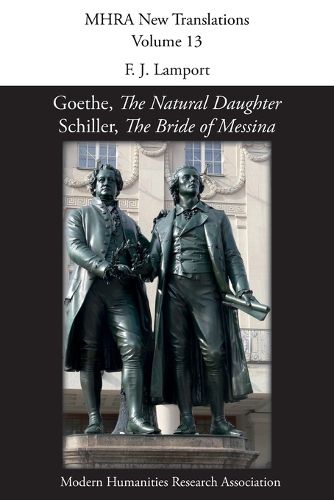Readings Newsletter
Become a Readings Member to make your shopping experience even easier.
Sign in or sign up for free!
You’re not far away from qualifying for FREE standard shipping within Australia
You’ve qualified for FREE standard shipping within Australia
The cart is loading…






This title is printed to order. This book may have been self-published. If so, we cannot guarantee the quality of the content. In the main most books will have gone through the editing process however some may not. We therefore suggest that you be aware of this before ordering this book. If in doubt check either the author or publisher’s details as we are unable to accept any returns unless they are faulty. Please contact us if you have any questions.
Written in 1802-03, The Natural Daughter and The Bride of Messina show Goethe and Schiller writing in a neo-classical manner far removed from the Sturm und Drang style of their early works. The plays reflect their authors’ reaction to the troubled post-Revolutionary years of their composition – a counter-Revolutionary one, both in an aesthetic and at least implicitly political sense. Their eponymous heroines embody hopes of restored familial harmony and political order, yet in both plays those hopes are tragically frustrated. Goethe’s Eugenia, natural daughter of the Duke, is abducted and threatened with exile by a political conspiracy, and must renounce her aristocratic aspirations. Reduced to bourgeois anonymity, she hopes nevertheless one day to re-emerge and serve King and country, but the ending of the play is at best ambiguous. Schiller’s Beatrice is loved by both Manuel and Cesar, brothers whose mutual hatred has plunged Messina into civil strife. Deception, misunderstanding, and a terrible secret weave a fatal web, whose unravelling leaves both brothers dead and Messina rulerless to face an uncertain future.
F. J. Lamport’s bold new verse translation captures the highly refined, deliberately artificial style of these two unusual plays which, though less well known than some of their authors’ other works, represent a remarkable poetic achievement.
$9.00 standard shipping within Australia
FREE standard shipping within Australia for orders over $100.00
Express & International shipping calculated at checkout
This title is printed to order. This book may have been self-published. If so, we cannot guarantee the quality of the content. In the main most books will have gone through the editing process however some may not. We therefore suggest that you be aware of this before ordering this book. If in doubt check either the author or publisher’s details as we are unable to accept any returns unless they are faulty. Please contact us if you have any questions.
Written in 1802-03, The Natural Daughter and The Bride of Messina show Goethe and Schiller writing in a neo-classical manner far removed from the Sturm und Drang style of their early works. The plays reflect their authors’ reaction to the troubled post-Revolutionary years of their composition – a counter-Revolutionary one, both in an aesthetic and at least implicitly political sense. Their eponymous heroines embody hopes of restored familial harmony and political order, yet in both plays those hopes are tragically frustrated. Goethe’s Eugenia, natural daughter of the Duke, is abducted and threatened with exile by a political conspiracy, and must renounce her aristocratic aspirations. Reduced to bourgeois anonymity, she hopes nevertheless one day to re-emerge and serve King and country, but the ending of the play is at best ambiguous. Schiller’s Beatrice is loved by both Manuel and Cesar, brothers whose mutual hatred has plunged Messina into civil strife. Deception, misunderstanding, and a terrible secret weave a fatal web, whose unravelling leaves both brothers dead and Messina rulerless to face an uncertain future.
F. J. Lamport’s bold new verse translation captures the highly refined, deliberately artificial style of these two unusual plays which, though less well known than some of their authors’ other works, represent a remarkable poetic achievement.